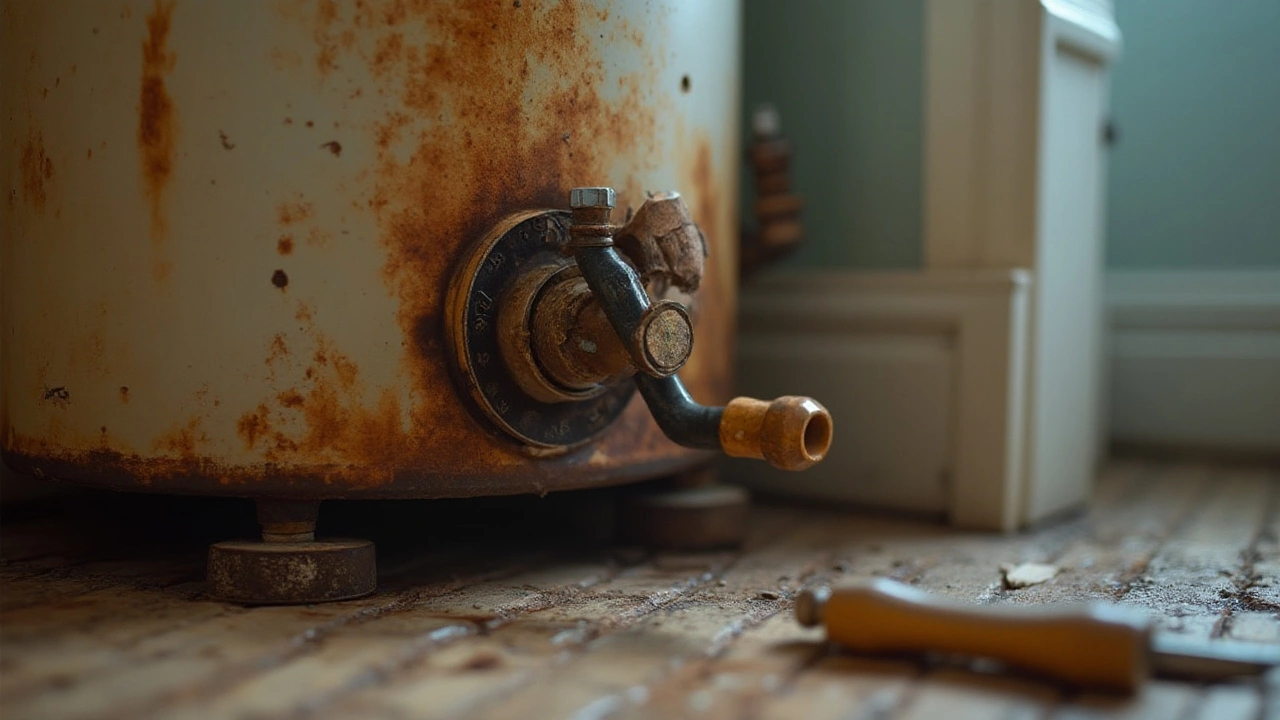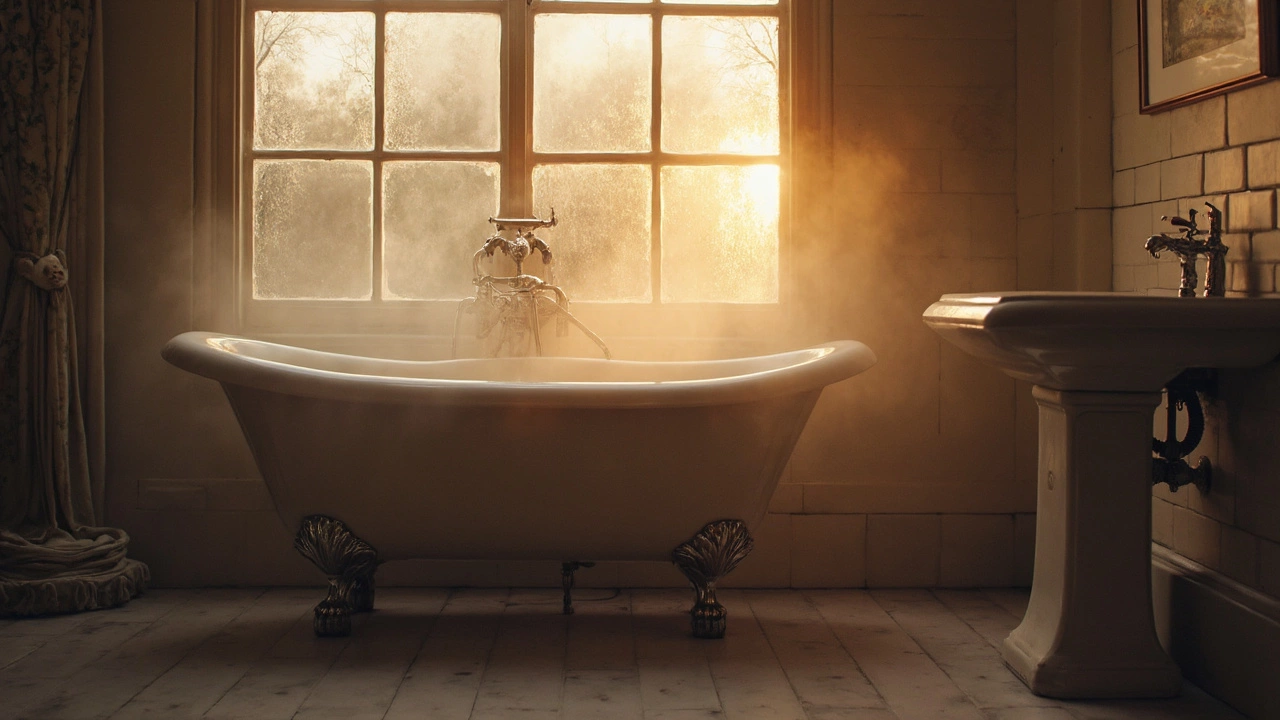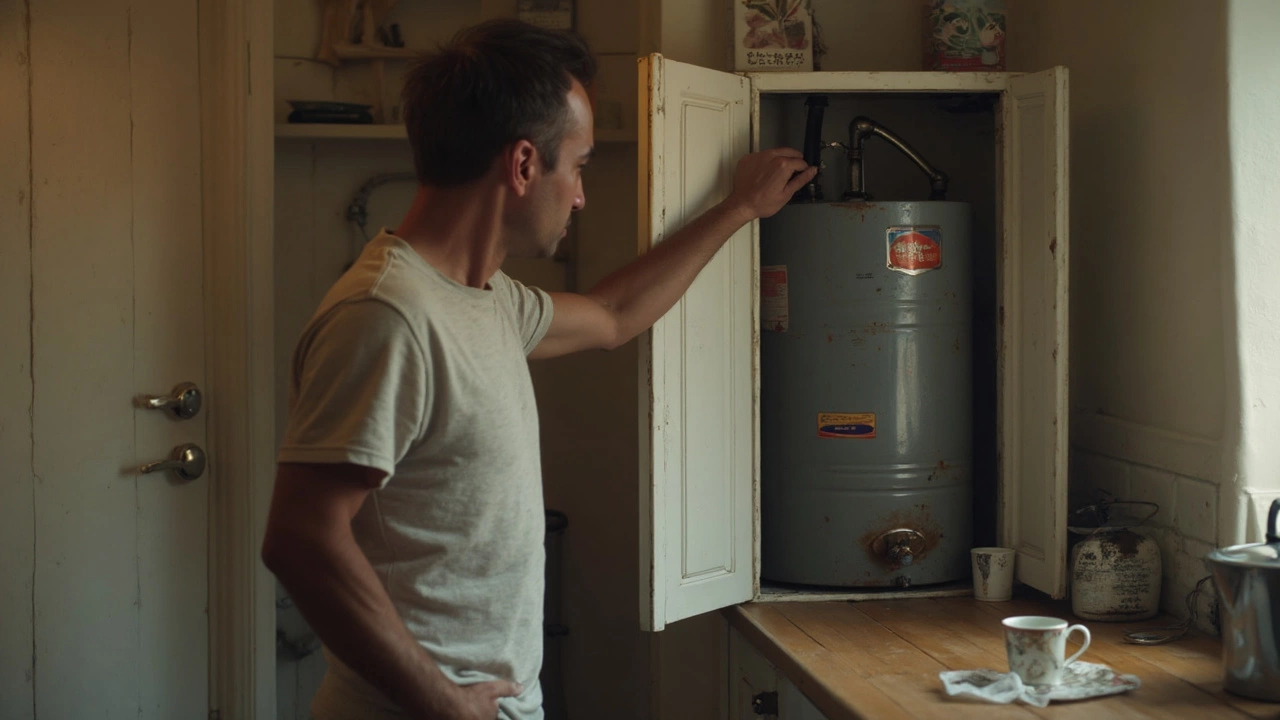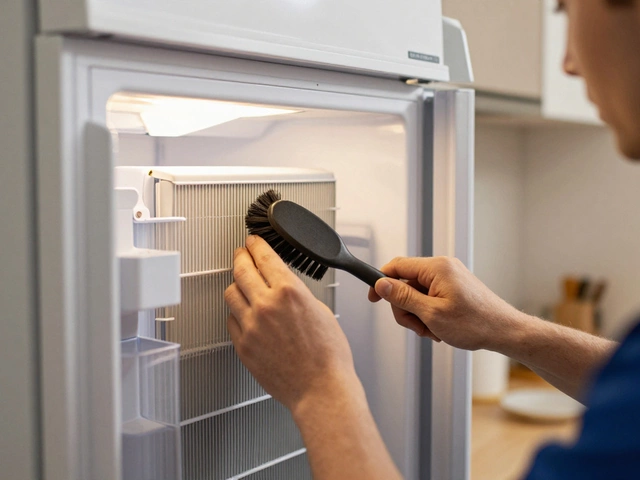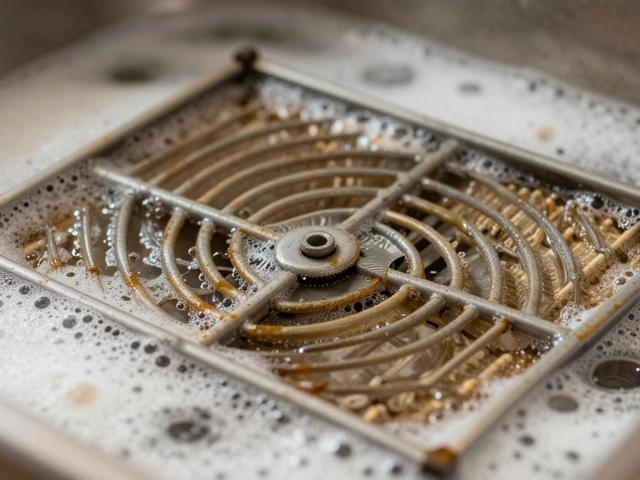Water heaters are a staple in almost every home, yet they can be one of the most overlooked appliances until something goes awry. Even the most robust models eventually encounter issues like lukewarm water, strange noises, or sudden leaks. In this article, we'll dive into the typical problems you might face with a water heater and how best to tackle them.
Understanding what usually goes wrong with water heaters can save you a great deal of frustration and expense, and possibly help you determine when it's a simple fix or when it's time to consult a professional. Read on to discover useful insights into maintaining your water heater and ensuring your showers aren't ruined by an unexpected blast of cold water.
- Signs Your Water Heater Needs Attention
- Common Water Heater Malfunctions
- DIY Tips for Quick Fixes
- When to Call a Professional
- Preventive Measures to Extend Heater Life
Signs Your Water Heater Needs Attention
Spotting the early signs of trouble in a water heater can prevent a minor inconvenience from spiraling into a major repair bill. One of the most obvious indicators that your water heater is in distress is a drop in water temperature. If the water isn't as hot as it used to be or fluctuates routinely, your heating elements or thermostat might be in need of checking. Old-age often contributes to inefficiency, reducing a water heater's ability to maintain consistent heat. A decrease in energy efficiency is often heralded by unusually high energy bills, which is a direct result of the heater working overtime to perform basic functions.
In addition to temperature woes, listen for any unusual noises emanating from your water heater. Gentle hums are normal, but rumbling or banging sounds suggest sediment buildup at the tank's bottom. Sediment can form from the minerals in water, like calcium and magnesium, which settle and harden over time. These hardened sediments can overwork your water heater as it heats the water, causing not only noise but also diminishing the appliance's efficiency. Do not ignore leaks, whether they're small or large. Signs of moisture around the base of your water heater can indicate serious complications, ranging from a faulty valve to a corroded tank itself, both of which can lead to significant water damage.
Discolored water is also a warning flag. If rusty or brownish water is flowing from the hot tap, it suggests corrosion within the tank or connected piping. An older device is more prone to this problem as materials degrade with time. In some cases, what's needed might just be a replacement of the anode rod, which is a simple fix, but ongoing neglect could require a new tank altogether. There's also an odd odor to be wary of – a metallic smell or a rotten egg scent could hint at bacteria action or chemical reactions happening within the tank, especially if your unit connects to a well supply.
"Routine inspections and timely maintenance are essential to prolong the longevity of your water heater," said a plumber, James Walters, during a recent seminar on home maintenance. "Neglect not only cuts short the appliance's lifespan but can considerably escalate repair costs."
An overlooked water heater issue that many homeowners miss is inconsistent water heating time. If it takes surprisingly longer to get hot water than usual, this could be due to an aging heating element that needs attention. In some cases, this lag causes increased energy use and discomfort, especially during peak mornings. Finally, keep an eye on your water's Taste. Metallic or mineral-ridden water is another clue suggesting something is amiss, and should push you towards investigating possible issues with your tank.
All these symptoms are easy to discover through regular inspections. Regularly inspect places where pipes connect to your heater for visible signs of corrosion, as they may be at risk. Remember, many of these signs need attention as they worsen if ignored. Regular servicing every couple of years by a professional can ensure no surprises arise. Being proactive with maintenance, such as flushing your tank to remove sediment or replacing worn components, can save both headaches and a significant amount of money over the water heater's life cycle.
Common Water Heater Malfunctions
At some point, every homeowner will likely face the inevitable reality of dealing with a misbehaving water heater. One of the most frequent issues encountered is a failure of the heating elements. These elements are essential components inside electric water heaters, responsible for heating the water. When they malfunction, you might notice a lukewarm shower that never reaches the temperature you desire, causing a significant inconvenience, especially in colder climates. Checking these elements involves accessing the heater's panel to probe for any signs of power failure, which could require replacements that aren't usually complicated but demand keen observation.
Another common problem is thermostat-related issues. If your water is consistently too hot or not hot enough, the thermostat might be to blame. These components regulate water temperature, ensuring it stays within the preset range. Thus, any deviation in their function can lead to water that's either scorching or tepid. Adjusting or replacing a faulty thermostat often resolves these issues, but caution should be taken to switch off the power supply before any attempt to inspect or repair it. A report from the U.S. Department of Energy suggests that proper thermostat maintenance can extend the lifespan of your water heater significantly.
A well-maintained thermostat isn't just about comfort—it's about conserving energy and reducing your power bills.
Tank leaks often top the list of dreaded water heater repair scenarios. These leaks can result not only in water wastage but also in potential damage to your home. The first sign of a leak might be puddles of water around the base of your heater, a low rumble, or even an unusual hissing sound. Identifying the source of a leak can be tricky, as it might be caused by a failing valve or corrosion within aging tanks. If the cause is a corroded tank, replacement is usually the only solution to avoid costly destruction of surrounding infrastructure. Checking valves and regularly flushing the tank can prevent internal corrosion, a small effort that yields long-term benefits.
For those DIY enthusiasts, a water heater problem might sound like an opportunity to showcase skill, but it's crucial to know when a professional should take over. A licensed plumber can swiftly handle complex issues and ensure safety, which is paramount when dealing with electrical or gas appliances. Statistics show that timely professional intervention can drastically reduce the likelihood of emergency replacements. While personal initiative is great, expert guidance often results in more effective and safer water heater malfunction resolutions.
Understanding the common water heater problems can arm homeowners with the knowledge to tackle minor repairs and recognize early warning signs. As these problems can develop quickly and quietly, regular inspections and maintenance are advisable. By staying vigilant and informed, one can maintain a safe, efficient hot water supply and avoid the unwanted surprise of a cold shower on a chilly morning.
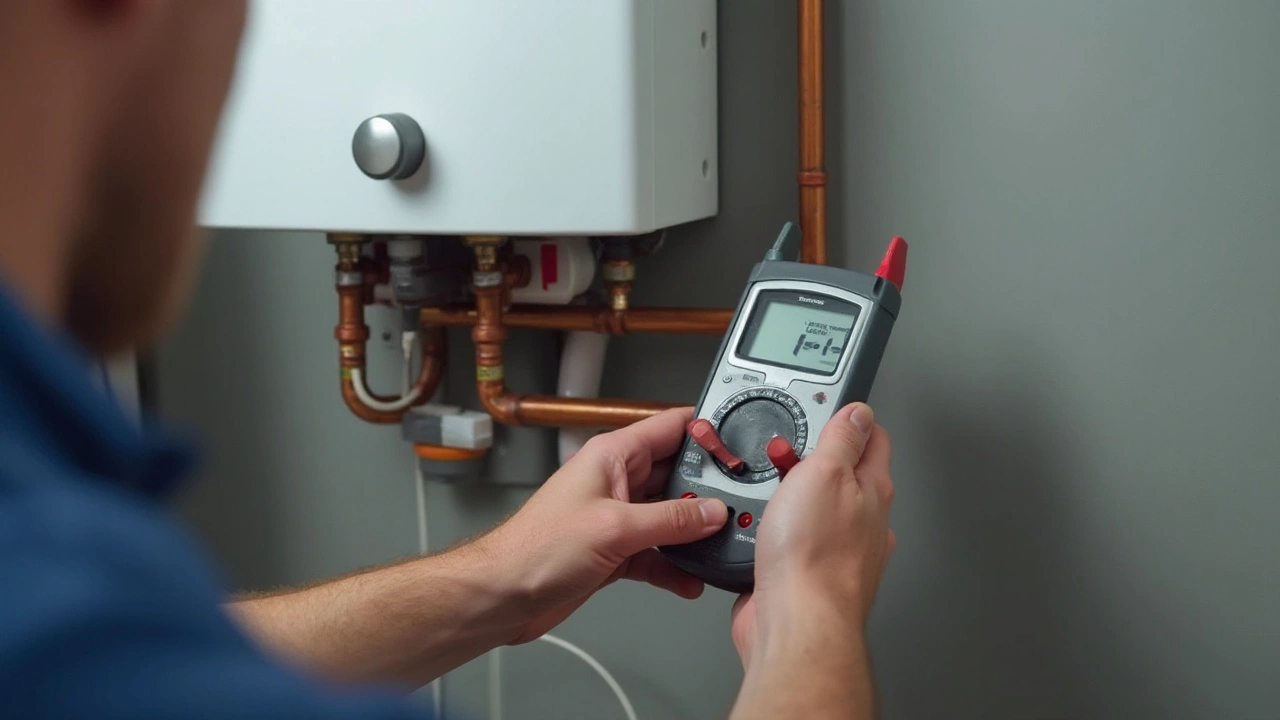
DIY Tips for Quick Fixes
When your water heater decides to throw a tantrum, knowing a few simple DIY tricks can save you from being caught in a stream of icy water. First and foremost, safety is key. Always begin by switching off the power supply to your water heater—this might mean flipping a breaker or turning off a gas valve. Once you're sure that there's no electricity or gas running to the unit, you can proceed with a bit more confidence. For those dealing with a lack of hot water, the issue often lies with the thermostat or heating elements. Adjusting the thermostat might seem daunting, but it's quite straightforward. Remove the access panel to get to the thermostat, and with a standard screwdriver, make minor temperature adjustments. Doesn't sound too scary, right? Now, step back and give the heater some time to adjust before checking if the water temperature improves.
Sometimes, you might notice rusty or discolored water flowing from your tap. This problem can often be traced back to the tank itself. Over time, sediment builds up, and this might need addressing. Draining the tank is a relatively straightforward process that might solve this problem—and give you cleaner water to boot. You'll want to hook up a garden hose to the drain valve and carefully flush out the water and any lingering sediment. Just be sure to keep an eye out as the tank drains; you might spot things like limescale and rust making their grand exodus. Don't worry—it's more common than you'd think.
If you hear odd noises, such as popping or rumbling, these might be signs of sediment build-up on the heating elements of your water heater. These annoying sounds could easily ruin your day, but the remedy often involves draining and flushing the tank, much like you would to clear up rusty water. If you continue hearing these noises, it might be time to call it a day and consider a replacement or further inspection by a professional. A trusted source on this matter might say that “Regular maintenance is the backbone of any well-functioning appliance.”
“Regular maintenance is the backbone of any well-functioning appliance.” - Home Appliance Experts
Another issue that might crop up is a constant and unexpected short cycling, where the heater turns on and off at abrupt intervals. One possibility is a faulty thermostat, so replace it if adjusting doesn't do the trick. Pay attention, though, as short cycling can also indicate something wrong with the tank's pressure and temperature relief valve, which should be releasing excess pressure to prevent your appliance from becoming a highly unwelcome explosive device. Regularly check on these components to prevent smaller issues from becoming catastrophic ones.
As a bonus, here's an overlooked tip: Insulating your pipes might actually save you from larger problems down the line. Colder regions especially benefit from pipe insulation, as it prevents heat loss and reduces the amount of energy the heater needs to produce consistent hot water. This small change can lead to greater efficiencies, keeping the heater's strain and your energy bill to a minimum. By implementing these simple yet effective DIY tips, you'll not only prolong the life of your water heater but potentially save yourself from some serious headaches and cold showers in the long run.
When to Call a Professional
Understanding when it's time to call in a professional for water heater repair is crucial to prevent further complications and potential hazards. While some issues can be tackled with basic DIY skills, there are situations where professional intervention is not just recommended but necessary. For instance, if your water heater is leaking from the base, it may indicate a significant underlying issue such as a failing tank. Procrastinating in such scenarios can lead to water damage and increased repair costs.
Another situation where you might want to reach out to an expert is when you notice your water heater making unusual noises. These noises, often described as pops or gurgles, could be a sign of sediment buildup at the bottom of the tank. While flushing the tank might seem like a straightforward task, the removal and prevention of sediment require specialized tools and knowledge to ensure thorough cleaning and prevent damage.
Professionals are also vital when dealing with thermostat glitches. If the water temperature fluctuates drastically or if resetting the thermostat does not resolve the problem, the thermostat might need replacing or recalibrating. Incorrect handling of these components can result in electrical hazards or further malfunction, which only a qualified technician should handle.
If your water heater is over a decade old, you might need an evaluation from a professional. At this stage, the wear and tear may have weakened several parts, leading to inefficiency and potential failure. An expert assessment can accurately determine whether a repair or a complete replacement is more cost-effective in the long run. Their experience allows them to foresee potential failures before they happen, saving homeowners from emergency repairs and inconveniences.
According to home improvement expert Bob Vila, "Consulting a professional isn't just about addressing current issues. It's about leveraging their expertise to prevent future problems and prolonging the lifespan of your appliance." This reinforces the value of regular professional inspections and maintenance for lasting efficiency.
Moreover, when dealing with any issues involving gas or electrical components, safety must always come first. Certified technicians are equipped with the proper training and certifications to handle these potentially dangerous repairs. They're also knowledgeable about the latest safety standards and local codes, ensuring that any work performed is compliant and prevents future risks.
For those looking for peace of mind, many professionals offer maintenance contracts which include periodic checks and tune-ups for a set fee. This approach guarantees that all aspects of your water heater are regularly monitored and kept in optimal condition. Investing in such a service might save more in potential repair costs while ensuring the continuous efficiency of your heater.

Preventive Measures to Extend Heater Life
Keeping your water heater in top condition doesn't just ensure you have hot water on demand, it can also help save money and extend the life of the appliance. Most water heater malfunctions are preventable with a little bit of know-how and regular attention. The trick lies in understanding what proactive steps you can take and incorporating them into your household routine.
One critical preventive measure is routinely flushing your water heater tank. Over time, minerals and sediment settle at the bottom of the tank, often leading to inefficiencies and potential damages. Experts recommend doing a full flush at least once a year. This involves turning off the heater, connecting a hose to the drain valve, and emptying the tank's contents. Don't forget to inspect the water that comes out — it's a good way to gauge sediment buildup. If you live in an area with hard water, be vigilant about this step, as mineral accumulation can be more rapid.
A strong water heater requires sufficient ventilation, so pay attention to where your unit is positioned. Blocked or inadequate airflow can lead to overheating and may become a fire hazard. Ensure the surrounding area is free from clutter, and consider installing a draft hood if you have a gas water heater to improve air circulation. Regularly checking the unit's vents for obstructions guarantees that air can flow freely.
“Regular maintenance can extend the life of your water heater by several years,” advises Jane Bryant, a home appliance expert with over 20 years of experience.
Another component often overlooked is the anode rod, sometimes termed the 'sacrificial rod'. This metal rod attracts corrosive elements, protecting the inside of the tank. Inspection of the anode rod every couple of years is vital. If this rod is worn or completely corroded, replace it to prevent rust from damaging the tank itself. A small investment here can provide a significant extension to your water heater's lifespan.
Temperature settings might not immediately pop up as a preventive measure, but they indeed play a critical role. Set your water heater's thermostat at 120 degrees Fahrenheit. This not only ensures safety, particularly for families with young children, but also optimizes energy efficiency. Lower temperatures reduce the risk of overheating and subsequently, damage to your heating elements.
Further, installing a water softener could be an excellent long-term investment, especially if your home receives hard water. This can drastically reduce mineral buildup and lessen the impact on your water heater. Investing in insulating pipes is equally prudent — not only for energy savings, but also to prevent potential issues like freezing.
Finally, even if you're comfortable doing some of these tasks yourself, schedule a professional inspection every couple of years. A professional can pinpoint any weak spots early and ensure your heating system is in optimal shape. Regular professional inspections, combined with diligent home maintenance, will give your water heater a much-extended life.
